The Wisdom Buddha Protector of Je Tsongkhapa's Tradition
Spiritual Lineage
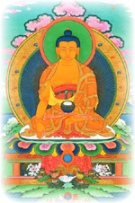
Buddha
Shakyamuni
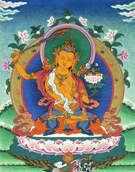
Buddha
Manjushri

Je Tsongkhapa
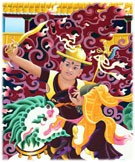 Wisdom Buddha
Wisdom Buddha
Dorje Shugden
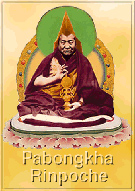
Pabongkha Rinpoche
(1878-1941)
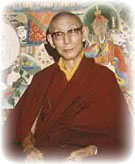
Trijang Rinpoche
(1901-1981)
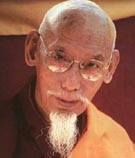
Song Rinpoche
(1904-1984)
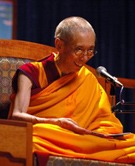
Geshe Kelsang Gyatso
(born 1931)
An interview with Geshe Cheme Tsering
Geshe Cheme is a respected spiritual teacher and elder. He received an Acarya degree from Central Institute for Higher Tibetan Studies, Sanskrit University, Sarnath, and he is a Lharampa Geshe at Ganden Shartse.
Interviewed in Delhi by Dr Ursula Bernis, October 22, 1997. He talks about the inside workings of the Tibetan government in exile and how the ban has affected him personally.
Q: What has the ban of Dorje Shugden done to you personally, to your life?
A: It is interesting how reality shatters your imagined perception. My perception of the inside workings of the Tibetan exile government has completely changed. My experience of this ban also has changed my perception of how His Holiness works within Tibetan society. It also changed my perception about how Western Buddhist centers and supporters of Tibet receive and give and gather information.
The Tibetan exile government is now perceived as experimenting with a democratic form of government. The long-term aim is to transform Tibet itself into a democratic country. But when it gets challenged to test the democratic principles, it does not stand up to the challenge at all. This was demonstrated by how they handled the ban. Usually in democratic countries issues are introduced through the parliamentary process and then taken up by the upper house and then the President. In this case and in many other cases it was brought up unilaterally by the Dalai Lama himself. In 1995 the oracles (mediums) advised him that continued worship of Dorje Shugden is not constructive for the Dalai Lama or the Tibetan government's work towards freedom. On March 10th and 21st, 1996, he publicized these oracular prophecies in a public teaching. Neither the Assembly, the Cabinet nor the heads of the four Tibetan Buddhist traditions, not even the head of the Gelugpas were consulted. After the announcement was made, it was endorsed by the Cabinet and the Assembly and became policy. That is how the Tibetan government works. Before we did not know these things, because we were not inside the problem. Now we are. So this is not theoretical to us.
When His Holiness first proclaimed the ban, he took the oracles as reference. "There is indication that it is harmful to me and Tibetan society, a negative effect for Tibetan society, if Dorje Shugden worship is continued." That is how he first put it in 1996. This theme was immediately taken up by the Tibetan government and its various branches around the world. When His Holiness was asked by an Indian journalist, the reason for the ban he said was, "Buddhism is a very profound religion and the worship of Dorje Shugden is denigrating Buddhism to the level of spirit worship." He also said that, "Worshipers of Dorje Shugden have been sectarian throughout history," when asked by a Western journalist about the reason for the ban. Here he opted for ecumenical unity between different Tibetan traditions: "The worship of Dorje Shugden is against the ecumenic spirit." On more than one occasion in the US and in Switzerland he even prohibited Western Buddhists [who rely on Dorje Shugden] from attending his initiations and teachings. From this and many other observations we have made one can say that whenever he makes announcements and gives reasons, they are more based on the expediency of the moment than a solid foundation applicable in the West and East both. First he said worship of the deity in Tibetan society is not good. If that is so, then why prohibit Westerners from worshiping Dorje Shugden? Going through all these reasons, His Holiness has given different ones everywhere. He has not given reasons that hold ground or have meaning everywhere. This has changed my perception about His Holiness.
Outside, His Holiness projects a picture of a very compassionate society and since he is a winner of the Nobel peace prize, people embrace that view of Tibetan society. But in reality I now find that what His Holiness tells the world about the need for compassion and loving kindness bears no relation to the actual way in which he treats his own critics in Tibetan society. Some of the Tibetan public in Dharamsala is clearly showing that they do not want to be a part of this ban anymore, since they have seen its destructive effect among Tibetans. If we look to the private observations of lower ranking Tibetan government employees, this much is evident. The Dalai Lama on the other hand has taken every opportunity, such as ordination of monks, public teachings in Dharamsala and those like his recent Kalachakra initiation near Darjeeling, to keep public indignation against devotees of Dorje Shugden at the boiling point. He misses no opportunity in these and other Tibetan gatherings to express openly that he is against the worship of Dorje Shugden. Unlike other politicians, this has very serious repercussions in Tibetan society. Once the Dalai Lama expresses his displeasure at someone, no matter who he is or however great his or her contribution to Tibetan society has been in the past, that person becomes a pariah overnight in Tibetan society. The key Tibetan policy makers know this very clearly. Front-ranking Tibetan intellectuals fought against this trend but have now come to the conclusion that at least in this generation the Dalai Lama has absolute hold over the Tibetan public and honest disagreement or dissension stand absolutely no chance. This is one of the reasons why my perception of His Holiness' actions outside and inside Tibetan society has changed.
Those in the Western world that are sympathetic to Tibet but have no exposure to Tibetan society at the family, government, or monastic level, do not have this understanding. Unlike any democratic society, the exile Tibetan community is a unique entity in itself. At the top level you have a handful of Tibetans who are intimately aware of shifts in international politics. This is mainly represented by the Private Office of the Dalai Lama. Below these people and far less powerful is the Tibetan exile government. In this government also, the key policy decisions are more often made on direction by the Private Office of the Dalai Lama rather than through parliamentary procedures or the wishes of the people. Below the government are sixty percent of Tibetans who are older -- monks and lay people alike -- largely unexposed to modern education, their mind frame stuck in ancient Tibet. This proportion of Tibetan people demonstrate no personal initiative to explore new ideas or methods or policies regarding the future of Tibet. Individually they are very efficient in meeting their personal necessities. They have almost blind faith in the Dalai Lama. This faith retains complete reliance on the Dalai Lama. When very carefully examined, this exposes two fundamental defects: (1). As far as the future of Tibet is concerned, at a subconscious level, they do not want to take any initiative or personal responsibility. (2). This lack of personal confidence breeds a hollow but inescapable blind trust that if they rely on the Dalai Lama, everything will be fine. Given these factors this mass of Tibetan people is an ideal and willing tool to propagate whatever policy or pronouncement the Tibetan government deems fit. The remaining 30 or 40% of Tibetans are the younger ones, most of whom are not well acquainted with or sufficiently grounded in their mother culture. So they really do not have a reference point to evaluate a modern society, outside society. Those who have sufficient knowledge of Tibetan society and the outside world have no voice in the Tibetan government to bring in fresh air. Some of these enterprising Tibetans started Tibetan political parties, but they became the target of intense public indignation and had to abandon their efforts. Others tried to express their view through the written media. They were either beaten by the mob or threatened within an inch of their lives. A few others started a newspaper of their own. It was so successful that it brought down the circulation of other Tibetan newspapers. However, a public rebuke by the Dalai Lama of this newspaper during a teaching in Dharamsala forced its closure. This is where the Tibetan exile community stands more than four and a half decades after they lost their independence to China.
Q: But how did the ban affect you personally?
A: Ever since 1962, when I joined the Tibetan school in Shimla in northern India until my graduation as Geshe Lharampa from Ganden Shartse in southern India in 1996, I have been an exemplary student. I always obtained A grades. Especially in south India I made more than my share of contribution towards the cause of Tibet and development of the monastic college. The Tibetan exile government is well aware of all these. I was even being considered for the post of official translator for the Dalai Lama at that time. I have never had any connections with China or Taiwan. This fact can be easily verified by anyone. After I voiced my disagreement against this ban in April 1996, however, the Tibetan exile administration in Dharamsala has used every conceivable method to destroy my credibility. For example, the Speaker of the Tibetan Parliament, Samdhong Rinpoche, in June 1996 spread the word in south India that I was holding two different passports. In New Delhi the Head of the Foreigners Registration Office tried to summon me twice, through notices, in an effort to revoke my permit to stay in India. The Bureau of the Dalai Lama in Delhi expressly sent its liaison officer more than once and told the concerned officers in the external affairs office of India that they must not renew my identity certificate [the yellow book issued to Tibetans in lieu of a passport]. None of these however succeeded. Most recently I have learned that the local foreigners registration office in Mundgod has been petitioned by front organizations of the Tibetan government in Dharamsala that they must not renew my RC [Registration Certificate]. This was in July 1997. This is just one part of the harassment that Dharamsala is subjecting me to. If I were to go to Dharamsala on my own, chances are that I would meet not only with public hostility but quite possibly I may be manhandled and beaten without mercy. But Dharamsala is not any exception in this respect. In any other Tibetan settlement in India, I am a marked man. If I were attacked in any of these settlements, no Tibetan would come to my defense -- would dare to come to my defense.
Political Leader
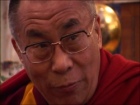 Dalai Lama
Dalai Lama
The Hypocrisy
Follow the story of the Dalai Lama's 30-year political campaign to destroy a centuries-old spiritual tradition taught to him by his own Spiritual Guide, and the efforts of those he's hurting to stop him:
Brief summary
- What is happening
- What is the Western Shugden Society (WSS)?
- Detailed reports of discrimination from inside India and elsewhere
The Dalai Lama's position
- A Great Deception
- Praise to Wisdom Buddha Dorje Shugden by the Dalai Lama
- In the Dalai Lama's words
Why is this happening?
- Why is this religious suppression taking place?
- Are the Dalai Lama's reasons valid?
Efforts to restore religious freedom
- Geshe Kelsang's open letter
- The ban is illegal and unconstitutional
- Press reports and videos
- Dorje Shugden Devotee's Charitable and Religious Society
- Dalai Lama sued for repressing religious freedom
- A conflict with a solution
- Announcement from Serpom Norling Monastery
Analysis of situation
- Sectarianism
- Can the Dalai Lama ever make a mistake?
- Is the Dalai Lama the only spiritual leader in Tibetan Buddhism?
- Theocracy or democracy?
- Spirit worship or authentic Buddhist practice?
- Freedom of worship
- The Dalai Lama's justifications
- Analysis by Dalai Lama's translator (PDF)
- What would Thomas Jefferson think of the 14th Dalai Lama?
- Book Reviews
- Videos
Evidence and first-hand accounts
- Chronological background
- Discord in exile documentary
- Political motivations for the ban
- Summary to date from Tibetan exiles
- Other
Ongoing persecution 2008-2010
- Recent vote sticks and call for help
- Forced signature and ID card campaign
- Persecution of monks at Sera Monasteries
- Public humiliation and explusion of monks
- Letter to Indian Prime Minister regarding abuses
- Letters from Dorje Shugden Devotees
- Urgent appeal from Sera Monasteries
- Support from Indian police
- Western Shugden Society letter to Sera monasteries
- Western Shugden Society letter to TGIE
- Heartfelt request from monks in Mundgod
- More discrimination planned around the world
- Letter from an FPMT monk
- Other
- What you can do